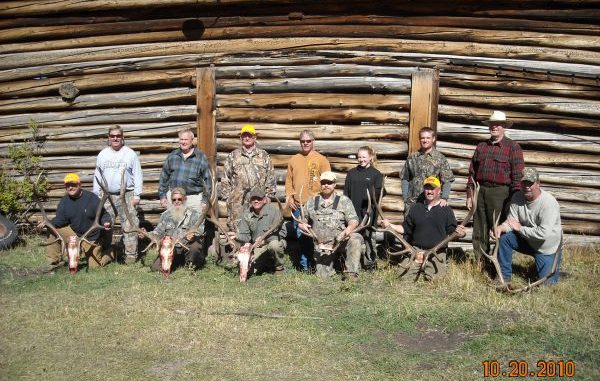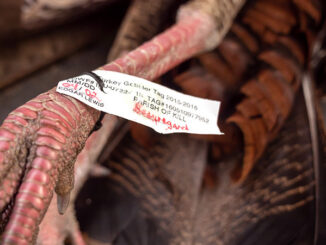
Clearing up myths about game wardens
In November I traveled to Colorado with a couple of friends for an elk hunt. Two of us are retired wildlife enforcement agents and one is still on the job with a few years to go before “graduating.”
It was a good trip even though only one of us bagged an elk — and it was not I.
Part of what makes these trips interesting and fun is that you get to meet other hunters from other states. This year was no exception, as we met guys from New York and Alabama.
Among the group were a state trooper, an electrician, a power line construction worker and a fellow who ran a family business involving a chain of fuel/retail convenience stores. As we got to know each other during the nights in camp, discussion would turn to work and how we went about doing our various jobs.
Naturally, hunters have a lot of curiosity about game wardens, and the three of us fielded more than our share of questions about laws and regulations, when and where we worked, the dangers involved and so forth.
It is very common during such discussions for people to express their beliefs and perceptions, and this time was certainly no exception. In fact, maybe even more so as a couple of the hunters were fairly vocal, inquisitive and willing to offer opinions.
So over the course of six nights in camp, numerous game warden myths were put on the table. We did our best to separate fact from fiction, and along the way it occurred to me that we still have a long way to go to clear up a lot of misconceptions. So I’ll make one more attempt here to replace fiction with fact.
Four of the greatest game warden myths came up in the high country, so let’s go ahead and discuss those in an effort to offer better understanding to the average reader — hunter or not.
The first, predictably, was brought forth on the first night in camp.
“Game wardens have more search authority than any other cop. They can walk in your house and look in the refrigerator or freezer anytime they want. They can go through everything in your vehicle on a whim.”
False.
We have as much authority for warrantless search as any other police officer; but not more so. The misunderstanding arises from the fact that a wildlife officer may search persons, game bags, coolers, boxes, baskets, compartments or anywhere else game or fish could be concealed when stopping someone in the act of hunting or fishing or immediately after such activity.
This was one of those things I had occasion to teach in the academy and in-service training with oversight from Louisiana Department of Wildlife and Fisheries attorneys. I’ll spare you the whole lesson plan, but suffice it to say we can search the boat or vehicle of someone fishing or hunting or still on the water or in the field after having just finished those activities.
Here is the best example: A wildlife agent approaches a boat landing used by duck hunters during an open season, and he sees a truck coming up the road leading from the landing. The boat is loaded with decoys, and boat and trailer are wet from being pulled from the water. The driver of the truck is dressed in camo (traditional hunting attire).
A stop, interview and search are appropriate here. A random stop of such a vehicle on the interstate or other public highway used by people engaged in a limitless variety of travel activities is not.
Neither is a warrantless search of someone’s home, freezer or refrigerator. It can’t be done on a whim and requires a search warrant signed by a judge just like any other police officer. And when going to the judge for the warrant, the officer better be able to provide good reasons why it’s needed.
Next: “Game wardens get to keep all the game and fish they seize.”
Nope.
In fact, that’s probably the best way I know to get fired. No one really knows how this one got started, but I do remember a book I read as a kid about a boy whose dad was a game warden. In the fictional story, the game warden dad caught someone with an illegal deer. He felt sympathy for the suspect and let him go, but kept the deer.
Maybe that’s where it got started. But the fact is game and fish are held as evidence in a department storage facility, sold to the highest of three bidders if it has legal commercial value or donated to the needy. When donated, a signed and dated receipt from the recipient must be attached to the arrest report.
Without going into detail, I will tell you that long ago, early in my career, I recall a couple of unscrupulous agents who were terminated when they couldn’t resist palming a few shrimp from a large seizure in a closed-season shrimping case. It is not tolerated.
Moving on: “Game wardens use that dummy deer (decoy deer) with a big old trophy rack to catch people. Its entrapment.”
No and no.
The decoy deer does have an interesting history, and its evolution throughout the country followed very similar changes and guidelines from state to state. Early designs were simple and primitive; my first was a wooden stake, 4 feet in length with a 4-inch-by-1-inch strip attached to the top. I painted the stake black with a white patch just below the top strip. To the top strip I attached two cardboard cutout “deer ears.” Between those went two small reflective tape “deer eyes.”
Set well back from the road behind a couple of pine saplings in the black of night, it was sure to draw fire.
From there, decoys went to deer-shaped cardboard cutouts, and from there to the full body mounts with motors to move head or tail.
Admittedly, some officers went too far by attaching better-than-average sets of antlers and in overuse of the decoy in others. So it was not long before written procedures dictated where and when decoys could be used, and antler size was restricted to none or a very modest 4- or 6-point set.
The courts were approached with agency concerns about entrapment. Consistent rulings and opinions put those concerns to rest.
One judge explained it in this way: A game warden and his buddy are riding along, and they see a deer by the road. The game warden says, “Go ahead and shoot it. I won’t arrest you.” The buddy shoots it, and the game warden then places him under arrest. That is entrapment.
But placing what appears to be a very average deer where one might expect to typically see a deer or other wildlife with no other encouragement of the offender to commit a crime, is not entrapment.
Finally: “You guys have to make your quota, so you write a lot of petty tickets just to get it.”
My smart-mouth answer is: “We don’t have quotas; we have standards.”
Sorry, couldn’t resist, but the truth is that there is no quota or required number of citations. But there are job-performance expectations that everyone is required to meet, and working wildlife agents are no different.
Conservation law enforcement is seasonal. Certain times of the year are far busier than others. As a working field agent, I dreaded the months of October and February. In my district in Central Louisiana those were slow months somewhere between fishing/boating season and hunting seasons. Not much was going on in either arena, and a citation could be hard to come by. It was very possible to go the entire month without “scratching” and that was not good, at least not for your pride.
But no quota ever existed, and we had a very simple and sound system for evaluating job performance.
Agents are compared only to other agents within their work district, working the same population and habitat types. Citation numbers are compared by average. So if the other agents in the work district are averaging 20 citations per month and one agent lags below average for a while, his supervisor will discuss job performance and ways to keep up. But never are a specific number of citations demanded or imposed.
So goes the quota myth.
One thing I learned on my recent trip to Colorado was people haven’t changed much since I retired, and I’m not sure we changed anyone’s misconceptions about game wardens. But it was sure fun trying, and I can’t wait until next year to do it again.
Good luck with your quota, whatever it may be.


